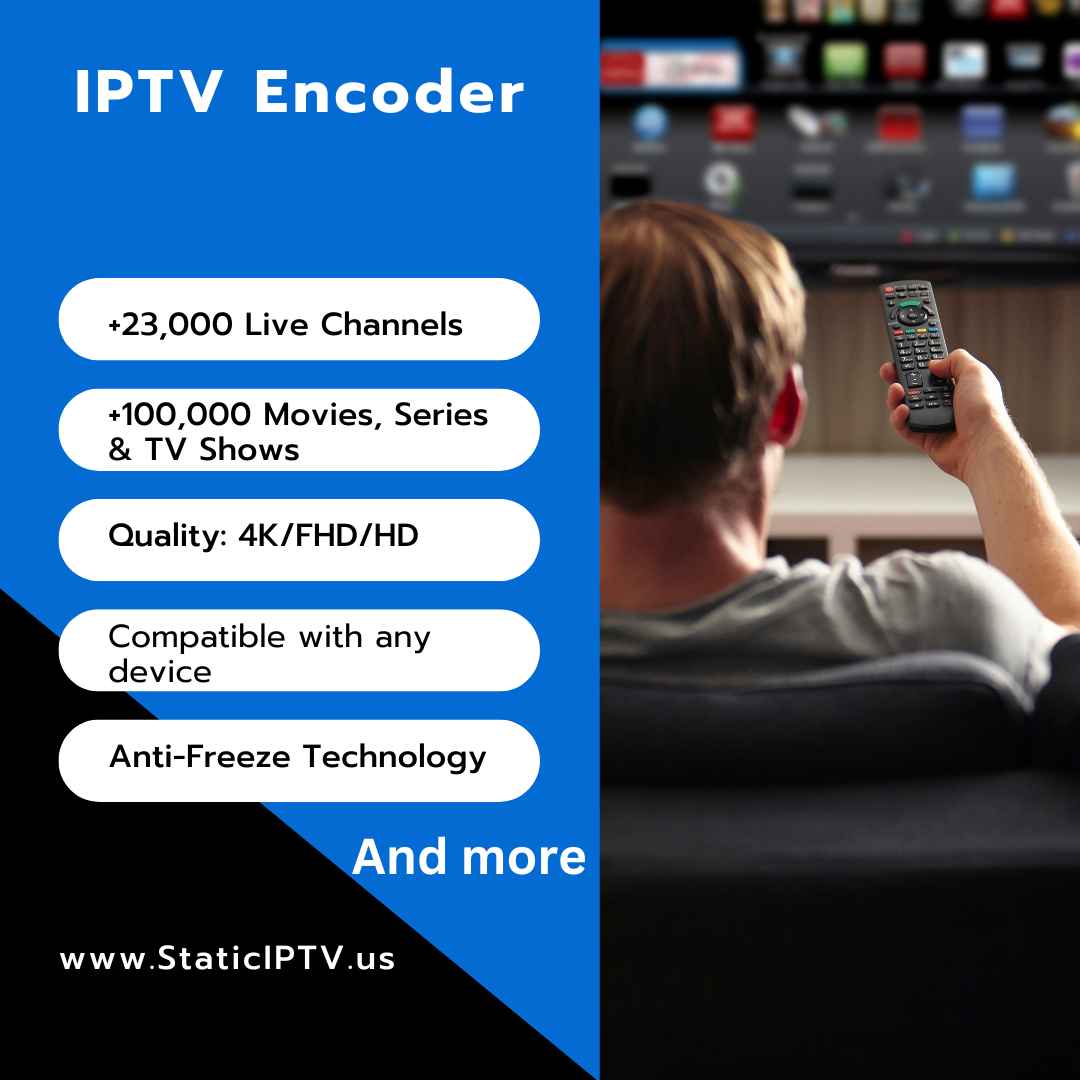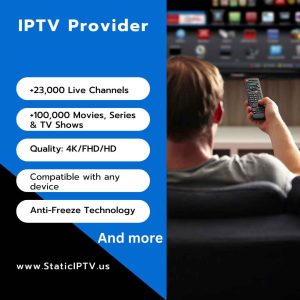IPTV Encoder with HDMI compatibility play a crucial role in delivering high-quality content to viewers. By converting video and audio signals into a digital format suitable for transmission, an IPTV encoder significantly enhances the streaming experience through advanced processing.
This article delves into the top IPTV encoders available on the market, discussing typical costs, scalability, and key features to consider when making a selection. Whether you’re a novice or an experienced user, understanding these features can help you choose the best device for your needs.
IPTV encoders not only improve streaming quality but also support live broadcasts and multicast transmissions, making them essential for a seamless viewing experience. Additionally, we explore how StaticIPTV.us can help you identify the perfect IPTV encoder with RTMP and HLS protocol support to meet your specific requirements.
Key Takeaways:
- An IPTV encoder is a device that converts audio and video signals to a digital format for streaming. Its key role is to stream content efficiently and ensure high-quality viewing experience.
- Some of the best IPTV encoders for streaming include MAG 322, Amino H150, and Haivision KB Mini. These devices offer features such as high-resolution streaming, multiple input options, and user-friendly interfaces.
- The cost of IPTV encoders can vary from $100 to over $1000 depending on the features and capabilities. However, budget-friendly options are available for beginners and small-scale streaming needs.
What is an IPTV encoder, and how does it work?
An IPTV encoder is an essential component within the digital broadcasting ecosystem, responsible for translating audio and video signals into compatible formats for streaming over Internet Protocol Television (IPTV) networks. By utilizing advanced encoding standards such as H.264, IPTV encoders facilitate a variety of transmission methods, including multicast and unicast, thereby ensuring reliable and real-time content delivery.
As the demand for high-quality video output and low-latency performance continues to rise, IPTV encoders play a critical role in enhancing the viewer experience by preserving broadcast quality across multiple devices.
These encoders are specifically designed to convert raw audiovisual data into streams that can efficiently navigate network infrastructures, ensuring reliable content delivery. The selection of encoding standards, such as H.264, significantly influences the quality and compression rates achievable, rendering it a preferred choice for both live and on-demand content delivery.
A comprehensive understanding of the distinctions between multicast and unicast transmission can lead to optimized network load and improved streaming performance, enhancing real-time delivery. Multicast is particularly effective for reaching multiple users simultaneously, whereas unicast delivers content on a one-to-one basis.
The integration of IPTV encoders into broadcasting systems necessitates meticulous management of encoding configurations and monitoring systems to ensure consistent quality of service. This approach enables adaptation to bandwidth fluctuations and facilitates seamless scalability to accommodate growing audience demands.
What are the best IPTV encoders available for streaming?
When evaluating the most effective IPTV encoders for streaming, J-Tech Digital emerges as a commendable option, providing scalable solutions that address diverse broadcasting requirements and ensure compatibility with multiple streaming protocols.
This encoder demonstrates exceptional support for both RTMP and HLS protocols, facilitating seamless transitions and dependable performance across various platforms including YouTube and Facebook.
Users value its capacity to manage multiple resolutions, ranging from standard definition to high definition, thereby accommodating a broad spectrum of content.
The installation process has been designed to be user-friendly, enabling individuals with minimal technical expertise to set it up efficiently.
User feedback underscores its consistent performance during peak usage times, establishing it as a preferred choice for broadcasters who prioritize stability and quality in their IPTV streams.
What features should you look for in an IPTV encoder?
When selecting an IPTV encoder, it is essential to prioritize several key features to ensure optimal performance and versatility. These include scalability to accommodate varying audience sizes, compatibility with multiple streaming protocols, and the ability to support high-resolution video output without compromising quality.
Furthermore, it is imperative for the encoder to support a range of encoding formats, such as H.264, as this enhances compatibility across different devices and platforms. Network management capabilities are also crucial, as they allow for real-time monitoring of streaming quality and bandwidth usage, significantly minimizing disruptions during broadcasts.
Additionally, low-latency processing is a vital feature that promotes a smoother viewing experience by reducing delay. Finally, ease of configuration is important; it enables content creators to quickly set up their streams, thereby maximizing their reach and engaging a wider audience with minimal technical challenges.
How do IPTV encoders enhance streaming quality?
IPTV encoders play a significant role in enhancing streaming quality through the utilization of advanced codecs such as H.264. These codecs optimize audio and video compression, ensuring high-resolution outputs while minimizing bandwidth usage and maintaining low-latency performance.
The selection of encoding format is crucial in determining the overall viewer experience. For example, opting for AAC audio over AC3 typically results in clearer sound quality, which is especially important for content that is music or dialogue-intensive.
High-efficiency formats like H.265 further enhance streaming capabilities by providing superior compression, enabling higher resolutions, such as 4K, and supporting multiple encoding standards like MPEG2, without significantly increasing data requirements. Additionally, low-latency encoders are vital for live events, ensuring that viewers receive content in near real-time, which is particularly advantageous for sports and gaming streams.
Conversely, the use of older or less optimized encoders can result in buffering and diminished quality, undermining viewer engagement and affecting audio output, including formats like AC3 and AAC.
Are there any specific IPTV encoders recommended for beginners?
For individuals new to the realm of IPTV, it is highly advisable to utilize user-friendly encoders featuring intuitive interfaces and essential functionalities. These encoders facilitate a seamless transition into streaming without the burden of overwhelming complexities.
Such encoders typically offer straightforward setup processes, allowing even those with limited technological expertise to easily engage in streaming their preferred channels. Key features, including adjustable bitrate settings, preset configurations, and integrated support for multiple formats, significantly enhance their practicality.
Additionally, many of these options are affordably priced, making them accessible to those on a budget.
Models such as OBS Studio and Streamlabs have received positive feedback from users for their reliable performance and user-friendly design. Numerous testimonials highlight the effortless setup and exceptional customer support that new users find beneficial.
Expert reviews consistently underscore that these encoders give the power to individuals to explore IPTV without encountering the steep learning curve commonly associated with advanced streaming tools.
How do you set up an IPTV encoder for optimal performance?
Setting up an IPTV encoder for optimal performance involves several critical steps, including proper installation, configuration of network settings, and adjustment of encoding parameters to align with the quality and resolution requirements of the target audience.
To achieve the best results, it is imperative to consider factors such as bandwidth management to mitigate disruptions during transmission, which may necessitate the establishment of appropriate bitrate limits and efficient signal control. Additionally, the selection of the appropriate video resolution-whether it is 720p, 1080p, or even 4K-can significantly impact both playback quality and network load.
Ensuring compatibility with various streaming protocols, such as HLS, RTMP, and HTTP, is essential for providing a seamless viewing experience across different devices. Furthermore, ongoing maintenance is crucial; regularly updating the software, monitoring network performance, and conducting quality tests using tools like VLC will help sustain consistent and reliable service over time.
What are the benefits of using a dedicated IPTV encoder versus software solutions, such as those compatible with HDMI and Ethernet?
Utilizing a dedicated IPTV encoder presents numerous advantages over software-based solutions, including superior performance in processing audio and video streams with AAC and AC3 formats, enhanced reliability during live broadcasts, and specialized features tailored to various streaming requirements.
These hardware-based devices are specifically engineered to efficiently manage high-definition content, ensuring minimal latency even during peak usage periods, with support for M3U8 and MPEG2 formats. In contrast to software solutions that often depend on the resources of a general-purpose computer, dedicated encoders possess optimized processing power designed expressly for multimedia tasks. This specialization results in real-time encoding capabilities that are essential for live events where precise timing is critical.
Dedicated encoders typically provide robust support for advanced streaming protocols like RTSP and UDP, enabling seamless integration with existing broadcasting infrastructures. This capability allows broadcasters to enhance their streaming quality and expand their reach with ease.
How does StaticIPTV.us support users in choosing the right IPTV encoder?
StaticIPTV.us offers comprehensive support to users in search of the appropriate IPTV encoder, providing expert recommendations, detailed comparisons of features, and guidance on compatibility with various streaming protocols to accommodate diverse broadcasting needs.
Users can access an extensive library of product reviews that outline the advantages and disadvantages of different encoders, ensuring they possess a well-rounded perspective prior to making a purchase.
The platform also includes a user-friendly comparison tool, enabling individuals to evaluate multiple options side by side, thereby facilitating the identification of the best fit for their specific requirements.
Along with these resources, StaticIPTV.us provides access to community forums where users can engage with industry experts and fellow enthusiasts, further enhancing their understanding and confidence in selecting the most suitable IPTV encoder.
Can IPTV encoders be used for live broadcasts, such as streaming on platforms like YouTube and Facebook, or just recorded content?
IPTV encoders are highly versatile tools that can be employed for both live broadcasts and recorded content, offering the necessary flexibility to effectively manage real-time streaming and video on demand delivery.
Equipped with advanced features, these encoders facilitate low-latency streaming, ensuring that viewers experience uninterrupted broadcasts-an aspect that is particularly critical during live events such as sporting events or concerts, particularly when using SDI interfaces. They support various compression formats, which enable them to adjust the quality of encoding according to the type of media being delivered, whether it is a dynamic live show or a pre-recorded film.
This adaptability allows IPTV encoders to efficiently accommodate varying bandwidth conditions while preserving a high-quality viewing experience. Consequently, they have become essential tools for broadcasters and content creators.
Frequently Asked Questions
What is an IPTV Encoder and why do I need it for streaming?
An IPTV Encoder is a device that converts live video signals using H.264 into digital format for streaming over the internet. It is essential for streaming as it ensures high-quality video and audio delivery to viewers, with minimal buffering and disruptions.
What are the best devices for streaming using an IPTV Encoder?
The best devices for streaming using an IPTV Encoder are the ones with advanced encoding capabilities, such as the Magewell Ultra Stream HDMI Encoder and the Teradek VidiU Pro. These devices offer high-quality video output, easy setup, and user-friendly features for seamless streaming, particularly when deploying HDMI connections.
Can I use any device as an IPTV Encoder for streaming?
No, not all devices are suitable as IPTV Encoders for streaming. Only devices specifically designed for this purpose, with advanced encoding technology, should be used to ensure a smooth and high-quality streaming experience for both the broadcaster and viewers.
Why should I choose StaticIPTV.us for my IPTV Encoder needs?
StaticIPTV.us offers a wide range of high-quality IPTV Encoders at competitive prices, making it a reliable and cost-effective option for broadcasters. Additionally, the company provides excellent customer service and technical support to ensure a seamless streaming experience for its customers.
How can I set up my IPTV Encoder for streaming with StaticIPTV.us?
Setting up your IPTV Encoder for streaming with StaticIPTV.us is easy and hassle-free. Simply follow the step-by-step instructions provided by the device manufacturer or contact the company’s technical support team for assistance. Alternatively, you can also opt for the company’s professional setup service for a worry-free experience.
Do I need any technical knowledge to use an IPTV Encoder for streaming?
While some technical knowledge may be helpful, it is not a requirement for using an IPTV Encoder for streaming. With user-friendly features and easy setup, anyone can use an IPTV Encoder from StaticIPTV.us to start streaming their content in high-quality to a global audience.





